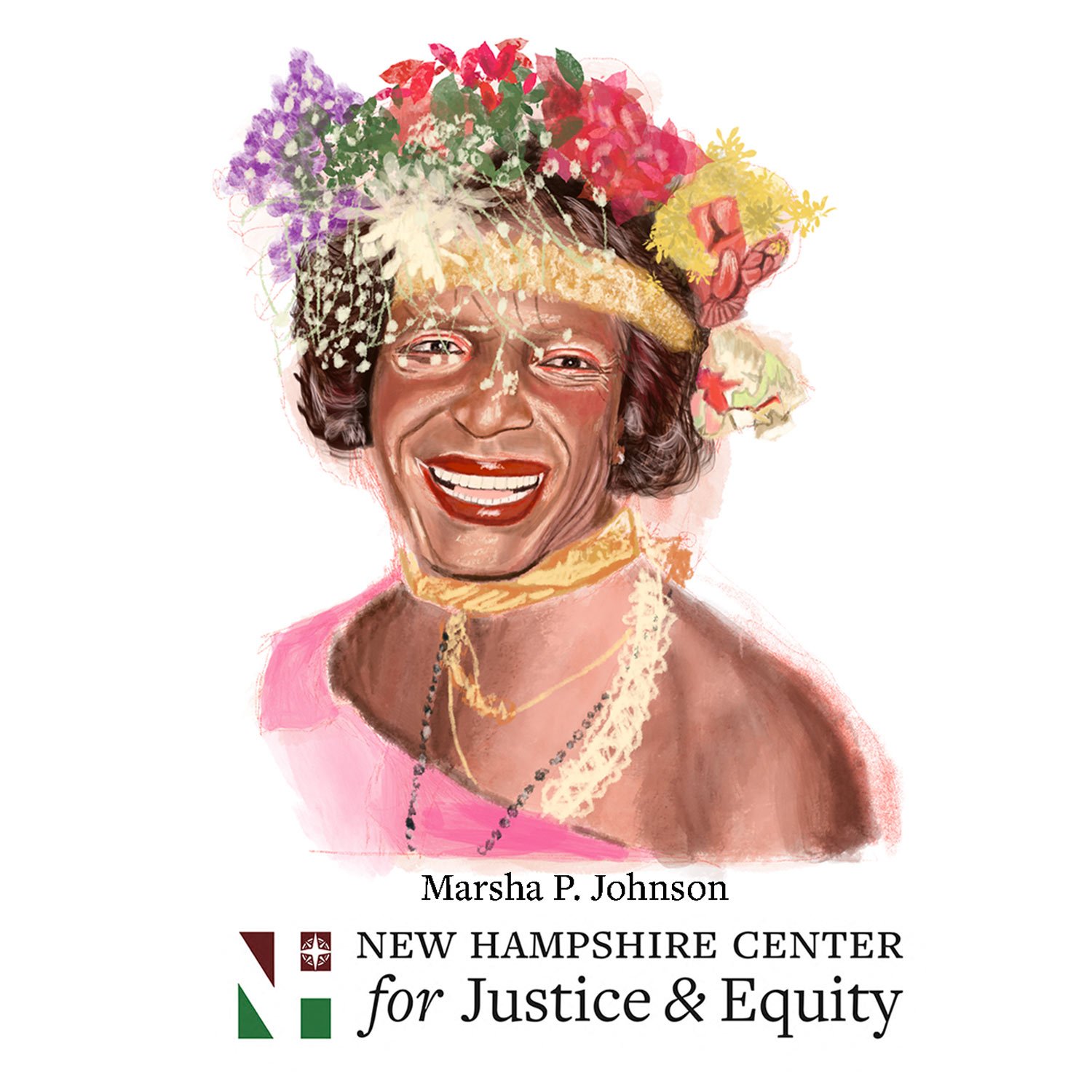Marsha P. Johnson: The Transgender Activist Who Pioneered the Fight for LGBTQ+ Rights
In our Icon Series, we reflect upon individuals who have laid the foundation for our journey toward justice and equity. The New Hampshire Center for Justice & Equity celebrates the extraordinary life of Marsha P. Johnson.
About Marsha P. Johnson
Marsha P. Johnson, a prominent figure in the gay liberation movement of the 1960s and 1970s, dedicated her life to advocating for the rights and visibility of transgender individuals and the LGBTQ+ community. Her contributions to the fight for equality, her role in the Stonewall Uprising, and her revolutionary activism have solidified her legacy as a trailblazer in the ongoing struggle for LGBTQ+ rights.
Early Life and New York City
Marsha P. Johnson was born on August 24, 1945, in Elizabeth, New Jersey, into a working-class, religious family. Assigned male at birth, Johnson began to express her gender identity at a young age, often wearing dresses, which prompted bullying and violence from other children. Despite hiding her authentic self due to societal pressure, Johnson moved to New York City immediately after graduating high school with little more than the clothes she was wearing. There, she found solace and community among other LGBTQ+ individuals and adopted the full name Marsha P. Johnson - the “P” stands for “Pay It No Mind,” which is what Johnson would say in response to questions about her gender.
“No pride for some of us without liberation for all of us.”
As an unsheltered teenager living in a marginalized community that was often persecuted and had no legal protection or rights, Johnson turned to sex work to survive. She experienced abuse from clients and was arrested by the police numerous times, but in drag, she found her strength and learned how to love herself and her identity. Johnson wore bright and colorful clothing she found at thrift stores or that had been discarded and often wore flower crowns, which became indissociable from her image.
The Stonewall Uprising
Johnson's life took a turn during the Stonewall Uprising. The Stonewall Inn, a popular gay bar in Greenwich Village, was routinely targeted by police raids and harassment. During a raid that took place in the early hours of June 28th, 1969, Johnson and other transgender and queer individuals fought back against discrimination and police brutality, sparking a multi-day uprising that marked a turning point in the LGBTQ+ rights movement.
The Stonewall resistance became a catalyst for increased visibility and activism for the gay liberation movement, leading to the establishment of advocacy groups and organizations across the United States. The year 1970 saw the first Gay Pride Parade and the birth of organizations like the Gay Liberation Front and the Gay Activist Alliance. However, despite her activism with these groups, Johnson denounced the exclusion of transgender individuals and people of color from the gay liberation movement.
Activism and the Founding of STAR
As a result, in the same year, Johnson co-founded the Street Transvestite Action Revolutionaries (STAR) with her close friend and fellow activist Sylvia Rivera, to fight transphobia. It is important to note that the term “transgender” only became commonly used after Johnson’s death, and she commonly referred to herself as a gay person, a transvestite, and a drag queen and used she/her pronouns.
STAR was one of the first organizations in the United States to advocate for the rights of transgender individuals and provide support for unsheltered LGBTQ+ youth who were rejected by their families. Through STAR, Johnson and Rivera worked tirelessly to provide housing (STAR House), food, and support to marginalized queer and trans individuals who, like themselves, faced discrimination and violence on the streets of New York City.
Johnson's advocacy work with STAR emphasized the importance of community support, empowerment, and solidarity among LGBTQ+ individuals, especially those most vulnerable and marginalized. Her efforts helped raise awareness about the challenges faced by transgender individuals, including homelessness, discrimination, and lack of access to essential resources and support systems.
Legacy and Recognition
Despite sporting a wholesome, smiling presence, Johnson faced numerous challenges and obstacles, including discrimination, homelessness, and violence, and spent time in and out of psychiatric hospitals during the 1970s. In 1990, she was diagnosed with HIV and was outspoken about the disease and the stigma surrounding it. Her activism always prevailed regardless of her personal struggles, which showed her lifelong commitment the to LGBTQ+ rights movement.
Her tragic death in 1992, initially ruled as a suicide, sparked outrage and demands for a thorough investigation, highlighting the systemic issues faced by transgender individuals, particularly those of color. Despite the community’s suspicions of foul play, as the 1990s were a time of rising violence against the LGBTQ+ community, Johnson’s cause of death was still undetermined. Her legacy as an influential transgender activist has been recognized and celebrated posthumously, with a growing movement to honor Johnson's legacy, with various initiatives, documentaries, and memorials dedicated to preserving her memory.
Johnson's relentless activism and resistance paved the way for greater visibility and acceptance of transgender and queer individuals. Her life and activism continue to serve as a beacon of hope and inspiration for those fighting for equality, representation, and justice, at a time when the LGBTQ+ community’s rights are being questioned. Marsha P. Johnson's unwavering commitment to the liberation of LGBTQ+ individuals remains an enduring symbol of resilience, courage, and the relentless pursuit of equality and acceptance.
Learn More About Marsha P. Johnson
marshap.org - The Marsha P. Johnson Institute
Marsha P. Johnson (1945-1992) - National Women’s History Museum
Who is your icon? We are collecting suggestions for the next series of NHCJE Icons. Let us know who you would honor. Click the button below and leave the name of your nomination.


